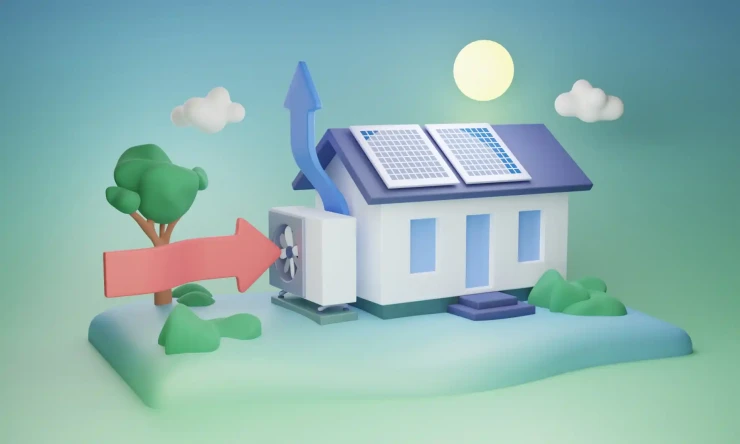As the darkest months of winter approach this year UK citizens will be wondering how to keep their homes warm and their energy bills down.
Many homeowners who are considering upgrading their heating systems will be asking whether heat pumps heat your home efficiently if you live in a cold climate.
Heat pumps can be a very effective way of heating your home and an excellent alternative to a gas or oil boiler as they are able to turn electricity into three times as much heat.
Heat pumps work by using natural heat that can be found in the ground, air or groundwater that surrounds your home. Air source heat pumps (ASHPS) work by drawing warmth from the air outside your home, so it is reasonable for people to ask what happens when winter hits and the temperature outside drops.
COMPARE PRICES FROM LOCAL INSTALLERS
Compare prices from local companies fast & free
Enter your postcode to compare quotes from leading professionals. We promise to keep your information Safe & Secure. Privacy Policy
Air source heat pumps (ASHPs) continue to work even when it gets cold outside and, in some cases, when the temperature goes all the way down to -25 degrees centigrade. They absorb the warmth that is generated when atoms and molecules move quickly through the air, and that warmth still exists even when the temperature drops below freezing.
Warmth is actually present in all air that has a higher temperature than absolute zero (-273.15 degrees centigrade) as atoms and molecules continue to move through the air until that point. Heat pump technology hasn’t quite made it that far though heat pump efficiency is increasing as the technology develops.
Celsius is a man-made scale and zero degrees doesn’t mean that there is no heat in the air at all. If there was zero heat, the earth would have reached a temperature of -273.
Heat pump efficiency is measured using Coefficient of Performance (CoP). This is calculated by comparing the amount of input to the amount of output. For example, if an air source heat pump uses one kW of electricity to produce three kW of heat, the CoP is three. The higher the CoP, the better, as this indicates your heat pump is more efficient.
Air source heat pumps (ASHPs) usually aren’t as efficient in cold temperatures as they are in milder conditions. This is because more electricity may be required to draw warmth from the air, which can result in lower efficiency.
Air Source heat pump systems (ASHPs) need to take in enough warmth to consistently heat up the refrigerant which is a liquid with a very low boiling point, until it turns into a gas.
The whole process will need more power when there’s less warmth in the air. However, air source heat pumps (ASHPs) start at a high bar, with the average model producing three units of heat for every unit of electricity it uses, which is three times better than a gas boiler.
When the temperature drops below zero this rate falls to around two units which still equates to twice as much as a gas boiler will produce per unit of electricity.
On the whole, air source heat pumps (ASHPs) require very little maintenance but if you look after a heat pump properly it could last up to 20 years compared to the average gas boiler’s lifetime of 15 years.
To ensure that a heat pump is as efficient as possible you should check that it has no exposed pipework, keep it clean and make sure the airflow isn’t being obstructed. Ideally, heat pump systems should be serviced every 12 months by a qualified engineer.
Those people who live in a particularly cold climate will be most concerned about getting a heat pump that can still work effectively all year round.
That’s when the ground source heat pump (GSHP) is the best solution as it is impervious to cold weather, due to being positioned underground.
This is because the ground temperature tends to be warmer than the air temperature. Therefore, a ground source heat pump (GSHP) could require less electricity to run, and it could produce a greater amount of heat.
Even if a garden is frozen over the layers of soil underneath will still be somewhere between 10 degrees centigrade and 13 degrees centigrade which the heat pump can use to provide a home with plenty of warmth. In the UK the temperature of the ground doesn’t usually fall below 10 degrees centigrade.
Of course, a ground source heat pump (GSHP) isn’t possible for everybody as they require more space and are more expensive to install, but the majority of air source heat pumps are also designed to work in freezing conditions, down to at least -10 degrees centigrade.
This is more than adequate for most customers in the UK.
There are some heat pumps that can even supply a home with warmth when the temperature drops as low as -25 degrees centigrade though it is extremely rare for temperatures to fall as low as this in the UK.
It’s important to choose the right heat pump for your home. Every heat pump is different, and the right equipment is needed to make sure your home can be heated throughout winter. This is not as big a problem in the UK as it is in countries such as Canada and North America where temperatures can drop to -30 degrees centigrade.
Heat pumps unlike other heating appliances do not use fossil fuels to heat homes and can lower CO2 emissions which helps to limit global warming. For this reason, heat pumps are becoming increasingly popular among homeowners who are conscious of the planet’s ecosystem and want to use more renewable energy sources.
Jan Rosenow of the Regulatory Assistance Project, which is an independent, global NGO advancing policy innovation and thought leadership within the energy community, estimated that switching to a heat pump could reduce energy bills in the UK by between £260 and £567 per year depending on the energy price cap at the time.
Replacing a gas boiler with an air source heat pump (ASHP) currently costs between £9,000 and £14,000 and with a ground source heat pump (GSHP) between £18,000 and £40,000. However, the government has introduced the Boiler Upgrade Scheme which offers rebates of £5,000 for ASHPs and £6,000 for GSHPs but this requires homeowners to fully insulate their homes first. Currently, there is no nationwide insulation scheme for people on average incomes.
There is no doubt that policies that would incentivise the uptake of heat pumps could have major benefits. The cost of new installations is likely to fall rapidly as the gas heating and plumbing industries gear up for them. As gas and oil heating are phased out the cost of gas is likely to rise making heat pumps that run on electricity a cheaper and cleaner option for everyone.





























